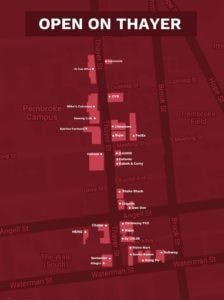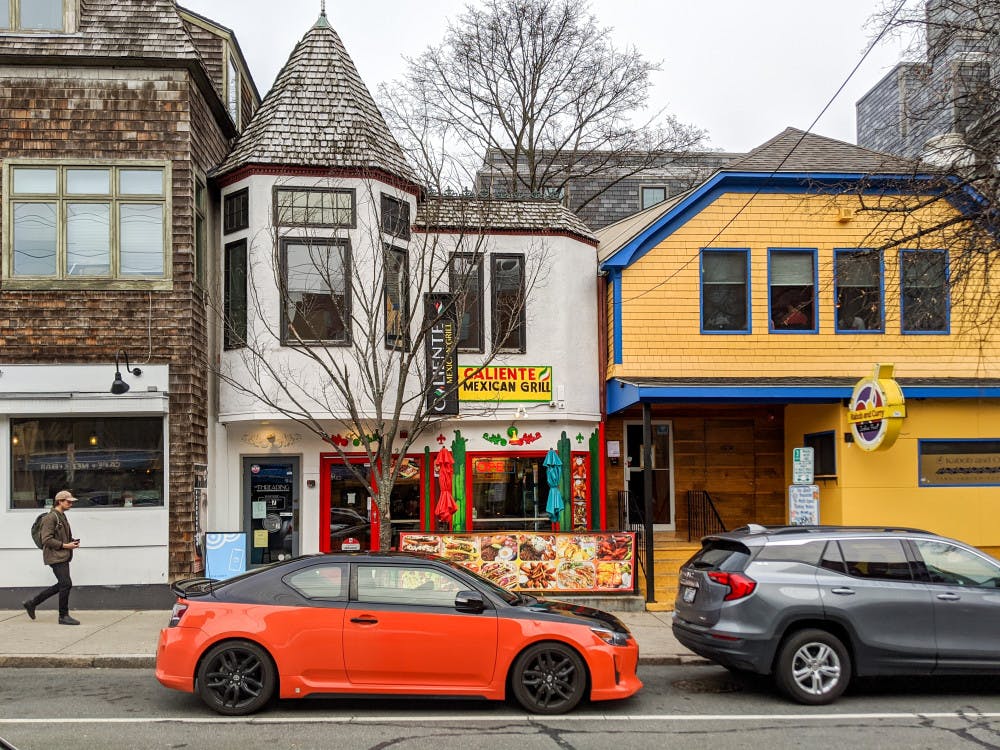Earlier this semester, a Monday afternoon on Thayer Street would mean students filling the windows of Blue State and Ceremony Tea, with lines stretching along the counters of Bajas or East Side Pockets.
Now, the street is nearly deserted.
In light of state rules in the same vein as global efforts to curb the spread of COVID-19, some restaurants on Thayer St. have closed down, while others have continued to offer takeout and delivery services. According to the Thayer Street District Management Authority, 18 restaurants remain open on Thayer St., while nine have temporarily closed.
In addition to restaurants, eight “essential service” businesses remain open, including banks, markets and shipping services. The remainder of retail stores on Thayer St. have temporarily shuttered in compliance with state regulations introduced last month that mandated the closing of all non-essential businesses and banned all on-premise service in bars and restaurants. At press time, the closures are slated to last until May 8.
[caption id="" align="alignleft" width="389"]

Despite the pandemic, some University student favorites — including East Side Pockets, Mike’s Calzones and Deli, Bajas Tex Mex and Bajas Taqueria — remain open and in service for the community. But state regulations enacted to mitigate the spread of COVID-19, coupled with the sudden exodus of their main customer base, have forced restaurants like these to make a fast transition away from in-person service to takeout and delivery, leaving many struggling to survive.
“Our Thayer Street District businesses have been severely impacted,” Donna Personeus, executive director of the Thayer Street District Management Authority, wrote in an email to The Herald.
Business has fallen precipitously for some restaurants. Paul Boutros, manager of East Side Pockets, said that their business has dropped about 70 percent since COVID-19. The restaurant has cut employment in half.
“Week after week, it’s gotten more challenging,” Boutros said. The largest hit to business came directly after students left: as hungry University students typically account for 30 to 50 percent of East Side Pockets’ business, he said. On Friday April 17, the restaurant closed temporarily — with plans to re-open this coming Friday, April 24.
Kabob and Curry, down the street from East Side Pockets, has cut their kitchen staff from six employees to two, according to Raj Mahajam, the restaurant’s manager. Mahajam, who has seen his working hours cut in half over the last month, prefers to refer to himself as a team member at the restaurant. “We live like a family, whether you’re a Kabob and Curry coworker or a customer,” he said.
The restaurant has also faced declining business, although Mahajam does not know precise numbers. April and May are typically among the busiest months for Kabob and Curry, and like East Side Pockets, a large portion of the restaurant’s business comes from Brown’s students.
Some University students remain on College Hill — either living off-campus or with approved requests to live in dorms — and have continued to patronize Thayer St. restaurants.
Eric Shaw ’20 lives in a house off-campus and has ordered from Thayer St. restaurants two or three times a week since the pandemic began. He says he orders in to support small businesses, as well as to feel “a tinge of normalcy.”
Shaw considers himself a loyal Bajas customer, but he also frequents Mike’s Calzones and Chinatown. He said he would be most upset if Bajas were to close because of COVID-19. “That has kind of been the staple for me for the past four years,” he said.
Others are reluctant to order food from Thayer Street. Sam Hornstein GS, who is still living in his off-campus apartment, used to eat on Thayer three to five times per week, but has only eaten out once since the pandemic began.
“Everything comes down to a risk analysis,” Hornstein said. “How can I limit my exposures and contact with people as much as possible?” After witnessing poor cleanliness when he ate out early in the pandemic, he decided that buying from restaurants was not worth the risk.
But Hornstein says that he worries about small businesses’ losses with fewer orders. “It’s going to be tough for them to meet their rent and other requirements,” he said. He is most concerned for single-location restaurants like Mike’s Calzones and East Side Pockets.
Many restaurants have begun to rely more heavily on third-party delivery services, such as Uber Eats, Grubhub and Postmates. With no in-person service, online delivery services have relieved some of the challenges of transitioning to a delivery- and takeout-only business.
But third-party delivery services come at a cost: They can take as large as 30 percent of the revenue from each order. Boutros said that losing that amount from each order removes all profit for the restaurant.
Kabob and Curry has their own app for online orders, but the actual deliveries arrive through Doordash. For Mahajam, the large cut that third-party delivery services take is not what matters to him right now.
“There is no win-win situation,” he said. “We are just keeping (the restaurant) open because we want to do something for the customers.”

Ben Glickman was the 132nd editor-in-chief and president of The Brown Daily Herald. He previously served as a metro editor and oversaw the College Hill and Fox Point beat, in addition to writing and editing about city politics, COVID-19 and the 2020 election. He is the co-creator of the Bruno Brief, The Herald's first news podcast. In his free time, he is passionate about birds (also tweeting) and eating way too spicy food.





